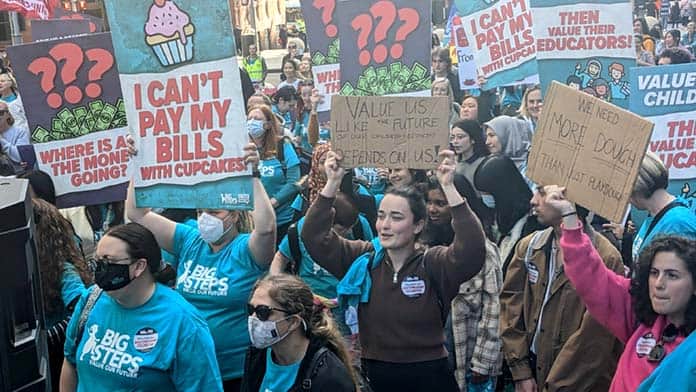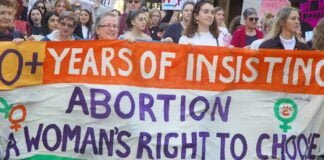The Labor government has been talking up its commitment to women’s rights since it came to power. Minister for Women Katy Gallagher called this year’s federal budget “the most significant single year investment in women’s equality in at least the last 40 years”.
But with wages trailing behind the skyrocketing cost of living, coupled with decades of neoliberalism, life for the majority of women in Australia has gotten even harder over the past year.
The federal election result was clearly driven, in part, by a rejection of the Morrison government’s sexism and disdain for women. In its final year in power the Coalition was plagued by sexual harassment and assault scandals, including a historical allegation against Minister Christian Porter and Brittany Higgins’ claim that she was raped by a fellow Liberal staffer in MP Linda Reynolds’ office.
Scott Morrison’s inability to empathise with or understand the plight of women and girls, for whom sexism is a daily reality, alongside his open transphobia and homophobia, saw voters turn away from the Coalition.
Labor promised to increase pay for low-paid women workers, boost childcare subsidies and implement all 55 recommendations of the Respect@Work report.
The Albanese government has introduced some positive, but very limited changes for women.
From July this year, the government will increase childcare subsidies to cover up to 90 per cent of the cost. The is designed to allow women to work more hours and will mean savings of $119 a fortnight for the average family.
Payments for single parents, 90 per cent of whom are women, will now continue until their youngest child is 14 rather than seven, partially reversing the Gillard Labor government’s cut to the payments that originally lasted until they were 16. The punishing ParentsNext program has been abolished.
A draft Family Law Amendment Bill is designed to reduce the likelihood of children ending up in the care of abusive parents. And the government has pledged $590 million towards ending violence against women, though this falls well short of the $1 billion annually that the sector says is needed to make a real difference.
Entrenched inequality
Much has been made of its decision to fund a 15 per cent pay rise for aged care workers, as well as changes to IR laws that allow multi-employer bargaining in the feminised sectors of aged, disability and early childhood care.
But these changes barely scratch the surface of the entrenched inequality and economic pain that women face.
Childcare costs in Australia are some of the highest in the developed world, at around 24 per cent of parents’ earnings, compared with 1 per cent in Germany and 16 per cent in Canada.
Increased subsidies often trigger a rise in fees and some centres have already hiked fees since the announcement.
And around nine million people live in “childcare deserts”, with over 3.3 children for every spot at a childcare centre.
The Labor government is not about to take the necessary step of nationalising childcare centres or nursing homes to increase places and decrease costs.
Years of stagnant, poverty-level wages have seen workers leaving both aged care and childcare in droves.
Albanese’s IR reforms will allow unions covering the care sector to bargain with multiple employers, rather than individual companies. Unions can strike but the Fair Work Commission still has tight control over the process, and can impose all the usual restrictions on union action including ruling strikes illegal.
The 25 per cent pay increase that childcare unions want should be the minimum in an industry that has underpaid and undervalued its workers for decades. Childcare centres get most of their funding from the government, but there is still no commitment to boost funding to allow workers a wage rise.
Cuts and cost of living
The cost of renting across Australia has gone up by around 14 per cent in the past year, with units up 24 per cent in Sydney and 23 per cent in Melbourne. This will more than consume Labor’s increases to rent assistance for those on welfare.
Labor is continuing to back the Stage Three tax cuts worth $15.7 billion annually that will overwhelmingly benefit high-income men.
This is money that could be spent funding domestic violence services, on better and free aged care and childcare facilities and closing the 13 per cent gender pay gap.
It is clear that Labor is not going to deliver the changes that women need in the midst of a cost of living crisis or to confront the persistent consequences of sexism in our society. Instead we will need strikes and protests, and to push beyond restrictive IR laws.
By Caitlin Doyle






